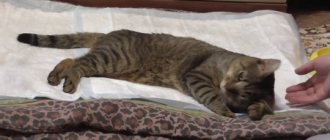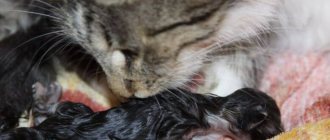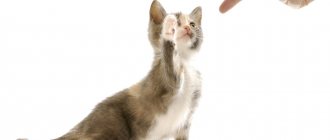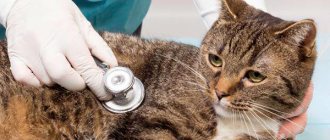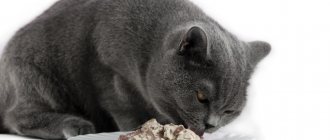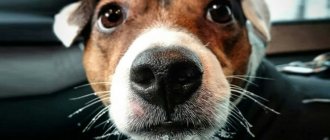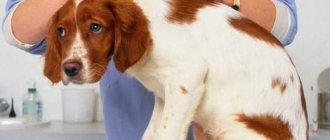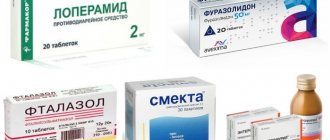Other reasons
A healthy puppy has a good appetite, grows quickly and gains weight, and looks active and cheerful.
The baby has normal stools - hard, uniform consistency, yellowish-brownish in color. The puppies' feces should not contain mucus, foam, bloody substances, particles of undigested food, or other uncharacteristic inclusions. If you notice that the baby has begun to diarrhea, or the puppy has frequent loose stools, you need to understand that indigestion for a small dog can end very badly, especially if the diarrhea does not go away within 24-48 hours.
Therefore, you need to adequately assess the situation and understand what caused and provoked diarrhea in the dog.
Causes of diarrhea in puppies:
- poisoning from low-quality feed, stale food, chemicals;
- unbalanced diet;
- too fatty foods (smoked meats, fatty meat);
- metabolic disorder;
- teething, changing teeth;
- autoimmune diseases;
- intolerance to any food components;
- indigestion, consumption of poorly digestible food, products from our table;
- habitual overeating;
- intestinal infections (colibacillosis, dysbacteriosis);
- viral, bacterial, invasive diseases;
- neoplasms in the digestive tract.
Diarrhea in puppies can be caused by an allergic reaction to any irritant, foreign objects in the gastrointestinal tract, severe stress, or a sudden transition to a new type of diet.
A sudden change in diet and routine often leads to indigestion. Therefore, diarrhea may be a consequence of the introduction of new products or occurs when changing food, for example, when switching to natural food from ready-made industrial food.
Loose stools in a puppy are observed with pancreatitis, liver and kidney failure, hypovitaminosis, and respiratory ailments (ARVI). Diarrhea in a healthy puppy at 4 months is most often caused by the change of baby teeth.
Profuse diarrhea, diarrhea with blood, water, mucus is one of the characteristic symptoms of viral, bacterial, fungal, parasitic infections (canine distemper, enteritis, hepatitis, leptospirosis).
One of the most common causes of diarrhea in a puppy of 2-3 months or in older dogs is a helminthic infestation. Worms (helminths) not only consume useful substances supplied with feed and food, but also violate the integrity of tissues and mucous membranes in the gastrointestinal tract, which leads to malfunctions in their functioning.
If the stool has an unpleasant odor, the stool contains mucus, undigested food particles, blood, diarrhea gives way to constipation, the dog loses weight, rest assured, your pet is infected with endoparasites.
Note that diarrhea in puppies often occurs after deworming or after vaccination. As a rule, this condition manifests itself a few hours after taking anthelmintics or administering a prophylactic vaccine. Diarrhea in a puppy after vaccination is due to the body’s reaction to the introduction of foreign antibodies with the vaccine. Moreover, today, thanks to the use of modern biological products for immunization, loose stools in puppies are extremely rare.
In addition to intestinal upset, other manifestations are possible on the first day (vomiting, nausea, decreased activity, allergies, drowsiness, refusal to eat).
Adverse symptoms after vaccination should subside within 24-36 hours. If the pet’s condition has not returned to normal, the puppy is getting worse, consult a veterinarian. Acute debilitating diarrhea, vomiting, lethargy, and other symptoms indicate the onset of a disease that was latent and intensified after preventive immunization.
Long-term use of pharmacological drugs also causes stomach upset in animals due to an imbalance of beneficial intestinal microflora. A similar condition is noted after a course of antibiotic-antiretroviral therapy or treatment with sulfonamides.
It is possible that the puppy ate something during a walk or as a treat; food from our table was used. Therefore, when walking with your pet, control its behavior and be sure to stop it from picking up dangerous “goodies” from the ground, which can cause severe poisoning.
Causes of indigestion
It is very important to know the factor contributing to the development of the pathological condition: the scheme and method of treatment will depend on this. When a dog develops diarrhea, there can be a variety of reasons. Here are the main ones:
- Eating disorder. An animal may eat spoiled food or something not intended for food (for example, a foreign object); sometimes changing the food is important. It happens that an animal’s stomach does not tolerate a certain type of meat. This is a purely individual trait that has nothing to do with any breed.
- Parasites, or rather worms - diarrhea in this case is inevitable, especially in young dogs. They are not visible to the naked eye in feces and the diagnosis can only be confirmed after laboratory tests. You must understand that an animal, sniffing grass, is always at risk of inhaling helminth eggs.
- Harmful bacteria in the gastrointestinal tract is also the main cause of diarrhea in dogs. Bacteria can be in a body of water, a puddle, or the feces of another animal. All your pet needs to do is lick them or contaminated water, and the pathogens will enter his body.
- Viruses. Unfortunately, there are a great many of these microorganisms, and only the animal’s immunity, strengthened by antibodies produced as a result of timely vaccinations, can protect against them.
- Poison, such as rat or insect poison. Often, owners spread such poison around the house, and a curious puppy collects it and eats it. In addition, the dog can be poisoned by heavy metals or chemical fertilizers from the garden.
- Taking other medications. For example, if a dog takes aspirin, a corticosteroid, or an antibiotic as part of treatment for a disease. These drugs disrupt the microflora of the gastrointestinal tract and cause diarrhea.
- Liver or kidney disorder. Usually accompanied by dark-colored urine. Diarrhea is a common clinical manifestation of these organ failures.
- Inflammatory processes in the pancreas - in addition to pain, often cause an upset stomach in a dog.
- Intestinal obstruction - the animal begins to vomit, diarrhea may occur.
- Hemorrhagic gastroenteritis - manifests itself as severe and frequent diarrhea, which has an unpleasant putrid odor and is black in color from blood that has entered it.
- The appearance of a tumor in the gastrointestinal tract.
- Allergic reaction.
- Severe stress. But such a disorder is one-time in nature and passes quickly.
Home » Dogs » Adult dogs » feeding puppies and adult dogs
If they help, then you can start giving light food.
Before feeding your dog with diarrhea, you should consult a specialist who will prescribe a diet. You don’t have to go to the hospital for this; in mild cases, you can just call the veterinarian.
Loose stools, diarrhea or diarrhea are stool disorders that often occur in both adult pets and puppies. The reasons may be different, sometimes the problem is associated with poor nutrition, in some cases with infections, but in any case the pet is bothered by unpleasant symptoms. Naturally, the dog needs to take certain medications and it is best if they are prescribed by a veterinarian. But another important question that arises in such a situation is what to feed a puppy with diarrhea?
If we take a closer look at how the canine digestive system works, a healthy pet will have bowel movements 2-4 times a day, usually after eating. But if we are talking about diarrhea, then the dog begins to behave restlessly, whine, and ask to go outside. As for puppies, they will leave puddles of liquid feces right in the house, since his toilet has not yet been established.
The main causes of diarrhea in puppies:
- consumption of low-quality, expired food, as well as products not suitable for feeding dogs;
- eating garbage, slops - babies are very inquisitive, and this behavior is inherent in most small puppies;
- transfer from one type of feeding to another;
- swallowing inedible objects;
- overfeeding your pet;
- manifestation of an allergic reaction;
- infection with worms and other parasites;
- taking medications;
- against the background of diseases of internal organs;
- due to tumor formations, etc.
Owners should be aware that frequent diarrhea is much more dangerous for puppies than for adults, as it can lead to severe dehydration in a short period. Therefore, it is important to ensure that the dog drinks the required amount of water and does not starve for a long time.
Until the cause of diarrhea is determined, it is worth putting your pet on a starvation diet. This necessary measure will help not harm the pet. In fact, diarrhea occurs as a result of intense work of the intestinal mucosa. It is responsible for the production of special enzymes that are necessary for the complete digestion and absorption of food. But when the receptors of the mucous membrane are irritated, it begins to work more actively to produce more fluid that washes the affected surfaces.
In order for the “intestines” to wash away irritating elements, it needs much more water than usual, and it takes it from the body. This is why it is important to provide your puppy with enough water. In addition, if during the “cleaning” of the intestines, food enters it, the body will perceive it as a possible threat, and the amount of mucus secreted will increase. This means that diarrhea will become even more frequent and severe.
Another nuance is that the intestines will not have the necessary enzymes to digest food, and in the aquatic environment it will rot. This will naturally increase the amount of poisonous toxins. If you feed your pet solid food during diarrhea, the sharp edges of the pieces can damage the walls of the digestive tract, and then a bloody mixture appears in the feces. The presence of bright red discharge indicates bleeding in the small or large intestine.
For diarrhea in adult dogs, the duration of the fasting diet is 24 hours, but it is not recommended to feed puppies in the first 10-12 hours after the onset of diarrhea. A longer fasting diet is not recommended for children. Thanks to such a forced fast, the intestinal mucosa has the opportunity to get rid of irritation and recover.
If the pet is less cheerful, often spins around at the feet when the owner enters the kitchen, but does not look sick, then there is no need to worry, and the process goes on as usual. The following symptoms should alert you:
- cyanosis of mucous surfaces;
- a significant decrease in body temperature: in puppies of small breeds below 38.5 ° C, medium - 37.5 ° and large - 37.3 °;
- the appearance of tremors, convulsions;
- breathing disorder.
Such signs signal a serious pathology, which became the cause of diarrhea.
Feeding a puppy is not an easy task, since while the owner selects the most suitable diet, the dog may develop diarrhea more than once. Often, intestinal upset occurs due to the fact that the pet eats fatty foods - fried chicken, pork, lard, well-oiled pancake and other “delicacies”, even in small quantities, can cause diarrhea.
With minor errors in nutrition, it is easy to resolve the situation. You should put your pet on a dietary diet and, after a short fast, feed the puppy rice water and liquid porridge for 1-2 days - without salt and oil, boiled in water!
If diarrhea is caused by your puppy not eating the right food on a regular basis, you should consult your veterinarian. The doctor will select products that are best included in the diet, help balance the menu and determine the norm. Unfortunately, many dog owners who decide to feed their pets with natural products face similar problems.
When a pet exhibits allergies or intolerance to many foods, the doctor may recommend switching the pet from natural food to a hypoallergenic ready-made food. If the product is suitable, then all the unpleasant symptoms of the puppy, including loose stools, will disappear.
We invite you to familiarize yourself with: Dry food for puppies of small, large and medium breeds of dogs
There are a number of rules that should be followed when feeding a pet suffering from diarrhea:
- you should give the puppy food in small portions, 5-6 times a day, but little by little - this will reduce the load on the inflamed digestive tract;
- products should not irritate the mucous membrane of the stomach and intestines, the sensitivity of which increases significantly during diarrhea. To do this, food must be steamed or boiled;
- The best dishes are pureed or semi-liquid in consistency - they are crushed or ground;
- You cannot give your puppy cold or hot food; it must be heated or cooled to 30-35°C.
If you adhere to similar principles, you can speed up the restoration processes of the stomach and intestinal mucosa, and your pet will feel improvement much faster.
If the puppy is diarrhea, the owner is advised to act as follows:
- it is necessary not to give him food for 12 hours;
- provide access to clean drinking water around the clock;
- If the baby refuses to drink, you need to give him something to drink.
When diet therapy is completed, foods should be gradually introduced into the pet’s diet, starting with rice water. The menu can also include the following:
- slimy porridges - rice, oatmeal, rolled oats, well boiled in water, without sugar or other additives;
- later you can cook porridge and vegetable soups in meat broth;
- lean boiled meat - turkey, chicken (if the pet is not allergic), rabbit;
- boiled lean sea fish;
- low-fat cottage cheese and fermented milk products without additives;
- mashed potatoes.
You should not worry about the variety of your pet’s diet; the menu should include several products. They are included in the menu gradually, one every 2-3 days, observing the reaction of the dog’s body.
The diet of a pet whose digestive processes are disrupted requires mandatory correction. The following products are excluded from the puppy's menu:
- bread - the exception is rye or whole grain crackers, which can be given in small quantities - 1-2 pieces a couple of times a week;
- milk, cream;
- fresh vegetables or canned vegetables;
- fresh vegetables, berries, fruits with sour taste;
- sausages, smoked meats, marinades and pickles;
- mushrooms and mushroom broths;
- sweets and baked goods;
- any legumes.
There is no place for such food on the menu of even a healthy puppy, not to mention a pet suffering from diarrhea. In addition, you should not treat your pet to fried food, food with spices and seasonings. Even if your dog constantly eats dry diets, it is not recommended to feed him such food during diarrhea. This is due to the fact that even the highest quality ones contain a certain amount of fat.
First aid for diarrhea in a puppy
If loose stool occurs, the dog owner must independently provide first aid and be sure to make an appointment with a specialist. Before visiting the veterinary clinic, the following actions are carried out:
- Wash and dry the drinking bowl thoroughly. Be sure to pour boiled water into it and try to give the baby something to drink.
- After defecation, remove feces and disinfect the tray, since a common cause of diarrhea is infection with pathogenic microorganisms that spread rapidly.
- If the puppy refuses food, then you should not force him to eat. Sometimes fasting has a positive effect on the affected microflora of the gastrointestinal tract.
- In many cases, vomiting helps (especially in case of poisoning). To do this, you need to force the puppy to drink one of the solutions in a warm state:
- Add 1 tbsp to 200 ml of clean water. l. salt, stir thoroughly;
- mix boiled water and hydrogen peroxide solution (3%) in equal proportions;
- add 1-2 crystals of potassium permanganate (potassium permanganate) per liter of water; the liquid should have a slightly pink tint.
- If you are poisoned by gases or chemicals, be sure to open the windows to allow fresh air to flow in. The mouth is washed several times with water, in which you need to put a little baking soda.
- If the puppy has been poisoned by toxic substances that have gotten into the fur, it is necessary to bathe it with soap products (laundry soap, baby soap).
- To prevent dehydration, which contributes to the death of the animal, you need to give plenty of fluids to drink. If the baby refuses, force him to drink using an enema bulb. For these purposes, the drug Regidron or saline solution is best suited.
- To remove harmful substances from the animal’s body, it is necessary to feed it with absorbents (Smecta, Enterosgel and the like).
When puppies are born, their body is not yet fully formed, especially the digestive and immune systems, so loose stools are considered normal. As it gets older, it should become denser, and the dog itself should gain height and weight. If unnatural diarrhea is detected, it is necessary to strictly adhere to the dosage of medications that correspond to the age category and weight of the puppy.
Newborns
In newborn puppies, the cause of diarrhea can be an allergic reaction to the introduced artificial or natural food, infection, or intolerance to the mother's milk. What to do in this case? After all, the body of such babies is very sensitive to various kinds of medications. In fact, there are antibacterial drugs that are approved for consumption immediately after birth. The main thing is to follow the correct dosage and not self-medicate your pet.
READ Puppy Constipation: Signs, Causes and Treatment. How to relieve constipation in a puppy using folk methods - Author Ekaterina Danilova
1 month
At one month of age, diarrhea occurs due to poor diet, teething, and infection. As in the previous case, gentle medications and dietary nutrition are used. Adsorbents must be used.
2 and 3 months
After 2 or 3 months of life, puppies are allowed many antibacterial agents that are aimed at destroying a specific pathogenic microorganism. During this period, teeth actively grow, which most often causes diarrhea.
4 months and older
As dogs grow older, they lead a more active lifestyle, so pathogens can easily enter their bodies (puppies will grab any objects in their mouths to scratch their teething teeth). Treatment is the same as for adults.
Before helping your puppy, make sure that the dog's diarrhea is not due to infection or any disease. Analyze what could have caused the intestinal disorder, after which the dog became worse.
Answer the following questions:
- Whether the pet was switched to a new diet or received familiar foods.
- What kind of bowel movements were there yesterday, the day before yesterday.
- How long ago was deworming and immunization carried out?
- Has the puppy had contact with other animals (stray cats, dogs, birds).
- Could the dog pick up something on a walk?
Let us remember that bloody diarrhea, diarrhea with mucus in combination with vomiting, lethargy, nausea, refusal to eat, and other symptoms require a qualified approach to treatment. In this case, call a veterinarian at home or take your pet to the clinic.
If there is no vomiting, the puppy responds adequately to stimuli, is cheerful, does not refuse food, the temperature is normal and most likely the cause of the dog’s loose stool is overfeeding, poisoning with stale food, treatment can be carried out at home. First of all, put your pet on a 12-24 starvation diet. Representatives of miniature and dwarf breeds, as well as newborn puppies, should not be fed for more than 6-10 hours.
In this case, the pet must have constant access to fresh drinking boiled water. If your pet refuses to drink on his own, pour water into his mouth in small portions through a regular syringe without a needle. Water can be replaced with sweet tea and herbal teas.
Even if the dog begs for food, treats, any food is prohibited on the first day. Especially if there is mucus in the excrement. Eating food can trigger vomiting and will only make the situation worse.
To normalize the electrolyte balance and replenish fluid loss in the body, give the puppy Regidron solution. The dosage depends on the age and weight of the dog. In severe advanced cases, infusion therapy is performed. Physiological solutions (isotonic glucose, Ringer-Locke solution) are administered intravenously to puppies.
Sorbents will help relieve intoxication and the effects of toxins:
- Activated carbon (1 tablet per 10 kg of weight).
- Smecta.
- Polysorb.
- Enterosgel.
The above remedies can also be used for diarrhea of unknown etiology. The main thing is to follow the dosage and carefully monitor the dog’s condition.
If intestinal spasms or strong peristalsis occur, Papaverine and No-Shpu can be diluted in water. Smecta also quickly relieves spasms in the gastrointestinal tract. In addition, the drug adsorbs toxins, neutralizes viruses and bacteria. The dosage and frequency of administration depend on the frequency, nature of bowel movements, age, and weight of the puppy. After dissolving the sachet in warm water, 2-4 month old puppies are given 0.3-0.5 ml several times a day.
For diarrhea, you can give your dog potato starch (dissolve a tablespoon in warm water), a decoction of oak bark, chamomile, St. John's wort, sage, and yarrow. These simple and affordable remedies have an astringent, anti-inflammatory effect. If the puppy has diarrhea, the symptoms of diarrhea are quickly relieved by steep rice water.
For severe profuse diarrhea, having correctly calculated the dosage, give the dog Loperamide, Imodium. To normalize beneficial populations of intestinal microflora, the puppy will be prescribed enzyme agents, prokinetics, probiotics (Lactovit, Linex, Hilak Forte, Mezim, Pancretin, Enterol, Lactobacterin, Lactobifadol).
For bacterial, infectious diarrhea, veterinarians prescribe Levomycetin, Enterofuril (1 ml for every 2.5 kg), Nifuroxazide, Furazolidone. The dosage, frequency of administration, and duration of treatment are selected by the veterinarian in each specific case.
In addition to treating diarrhea, therapy is aimed at relieving general symptoms and normalizing the condition of the sick animal. Four-fingered patients are prescribed anti-inflammatory, restorative, antibacterial agents, and broad-spectrum antibiotics. To eliminate vomiting - Cerucal, Reglan, other antiemetic drugs.
The duration of treatment can take from four to seven or more days. Do not skip taking medications, do not exceed the dosage indicated in the instructions for the medication. Medicines in tablets are best crushed into powder, mixed with water and poured into the pet’s mouth using an introducer syringe or a regular one without a needle. You can also add them to food or give them with your favorite treat.
If the puppy is diarrhea due to helminthic infestation, in addition to the main treatment, complex anthelmintics (IN-AP, prazicide, drontal, milbemax) will be prescribed. For puppies, it is best to purchase an anthelmintic in suspension or in the form of sugar cubes. Such medicines have a pleasant taste, so the treatment will proceed without problems.
First aid at home
If we are talking about diarrhea due to poor nutrition or mild poisoning, you can try to help the puppy yourself.
- Organize a small hunger strike for the puppy. Let the contents of the stomach and intestines be released entirely; the arrival of new food can increase the spread of infection in the gastrointestinal tract, and fasting, on the contrary, will relieve inflammation. The fasting period for large breeds is from 12 to 24 hours, for miniature breeds and newborn puppies - no more than 6-10 hours.
- Prevent dehydration. Pour warm, boiled water into a clean bowl for your puppy so he can drink at any time. If the puppy does not show interest in water for a long time, give it a drink using a syringe without a needle. Do not give the puppy too much water at once in this way; it is better to give little, but often. If the puppy becomes noticeably dehydrated, an IV can be placed.
- Clean up on time. To prevent the spread of infection, remove feces immediately and clean the tray and bedding thoroughly.
- Give your puppy absorbents. Vomiting and diarrhea remove harmful components from the body, but in order to speed up this process and alleviate the puppy’s condition, it is good to give adsorbents. Activated carbon, Enterosgel (softer and more effective than coal), Smecta (be careful, it cannot be given simultaneously with other drugs) are well suited for this purpose.
- You can try to make your puppy vomit. To do this, you will need a solution of potassium permanganate (bring the liquid to a slightly pinkish color), saline solution (1 tablespoon per full glass of water) or a mixture of water with 3% hydrogen peroxide (mix in equal proportions). Give one of these remedies to your puppy, preferably warm. This will speed up the healing process for minor poisonings.
Read Best Flea Treatments for 1, 2 or 3 Months Old Puppies
Be careful with the dosage of adsorbents, follow the instructions. Puppies at 1 month and at 2 months require different amounts of medication. At 3 months, when the permanent teeth begin to emerge, you can give your puppy something to chew on to relieve pain.
Therapy methods
The treatment regimen for puppy diarrhea depends on the cause. So, when infected, antibiotics are needed, which are selected taking into account the type of pathogen. Therefore, it is so important to go to a veterinary hospital, where the doctor conducts a comprehensive diagnosis, identifying the etiology of the origin of loose stools.
Drugs are prescribed on an individual level. But there are a number of medications and rules that must be used for any form of diarrhea.
Drugs
For pets, the same drugs are often used as for people, but the dosage is different (it is calculated by the doctor, but often puppies are prescribed a children's dosage). These may be the following medications:
- Activated carbon (black or white). Quickly adsorbs toxins, reducing the load on the liver. Feed the dog three times a day, 1 tablet per 10 kg of body weight. Puppies are allowed to feed from 4 months of age.
- Smecta also removes harmful substances from the body and improves the consistency of stool. Available in powder form, which is diluted with water. The drug is injected into a large syringe and the animal is soldered.
- Enterosgel is similar to the previous drugs, but is produced in the form of a semi-liquid gel, so it is very convenient to feed the dog.
- Levomycetin is a synthetic antibacterial agent that is always used for diarrhea. It is acceptable to give 1 tablet once (it is advisable to consult a doctor about the dosage for the specific age of the puppy).
- Enterofuril in the form of a suspension destroys infections and is prescribed by a doctor.
- Furazolidone restores the microflora of the stomach and intestines.
- Loperamide stops diarrhea. Giving is allowed once.
- Veterinary drug – Vetom (normalizes microflora during diarrhea).
- Polyphepan has sorption properties.
- Another adsorbent is Enterodes.
- An antiseptic that blocks toxic waste products of various types of pathogens is Nifuroxazide.
- Immunoglobulins with antibodies against plague, enteritis and adenovirus. Globcan-5 is considered the most effective.
- To strengthen the dog's immune system, stimulants are used: Gamavit, Ribotan, Fosprenil.
- Regidron and Ringer's lactate are used against dehydration. In the presence of severe dehydration, drugs are administered by drip or injection (under the skin, intravenously).
- Spasms are relieved with injections of No-shpa and Papaverine.
- Pacemaker – Sulfocamphocaine solution.
- For bleeding, Vikasol is prescribed.
READ How to name a female pug puppy
Feeding
The process of feeding during diarrhea plays an important role in general therapy. The algorithm of actions is as follows:
- On the first day of diarrhea, feeding any food is contraindicated. It is necessary to give only plenty of fluids.
- On the second day, you can boil broth from lean chicken meat.
- On the third day, boiled veal is allowed, vegetables boiled in water and fermented milk products are introduced.
Folk remedies
Traditional medicine is always used in the treatment of diarrhea. Herbal decoctions help destroy pathogenic microbes, eliminate inflammatory processes, and bind feces. In addition, they are aimed at strengthening the immune system and saturating the body with useful substances. What is allowed for animals:
- For a glass of boiling water you will need 2 tbsp. l. chamomile and St. John's wort. Let sit until cool. Give the puppy water twice a day, 2 tbsp. l. decoction
- Peel the pomegranate, throw the pomegranate skins into water and cook in a steam bath for 20 minutes. The dosage is the same as in the previous case.
- You can use bloodroot, sage and other herbs for diarrhea.
- Boil 2 tbsp in a liter of water. l. rice cereal. Give your pet a decoction three times a day, 2-3 tbsp. l.
6 useful tips
There are rules that must be strictly followed:
- Don't let your dog go outside and make sure he doesn't eat off the floor.
- If the animal shows little activity, then toys must be disinfected before giving.
- If the etiology of diarrhea is infectious, bedding, feeders and other objects with which the infected pet has been in contact must be treated.
- On the hungry (first) day, access to drinking water should not be limited (it should be in abundance).
- Portions during the recovery period should be small, meals should be fractional (at least 5 times a day).
- Eliminate stressful situations during treatment - show more affection and love to your puppy.
Diarrhea in newborn puppies
Acute diarrhea in newborn puppies is a very alarming symptom. The immune and digestive systems of babies are not fully developed. The gastrointestinal tract does not contain all the enzymes and beneficial microorganisms responsible for digestion. Therefore, the digestive tract of small puppies is very vulnerable. Any negative factors can cause various systemic and functional disorders and cause disruptions in the functioning of the gastrointestinal tract.
If a one-month-old puppy is bottle-fed, if the feeding regime is violated, overfeeding, and also if the baby receives low-quality, low-quality food (mother's milk substitutes, formula), diarrhea is very often noted.
Stomach upset in one-month-old puppies can be caused by milk. Puppies receive immune protection, nutrients, and vitamins from their mother's milk. Therefore, if a lactating bitch is sick, weakened, or receives a poor-quality, unbalanced diet, this will affect not only her health, but also the condition of the babies.
With slight overfeeding, the excrement has a yellowish color, with severe overfeeding it has a green, bright yellow color, which is explained by the presence of unchanged bile in the feces. Caused by too rapid movement of feed through the intestines. Gray liquid stool indicates a violation of enzyme activity, which is caused by overfeeding.
In a one-week-old puppy, an upset stomach may signal infection with streptostaphylococcal infection or E. coli (dysbacteriosis). Escherichia coli is a conditionally pathogenic microorganism that lives in the digestive tract, but under the influence of negative factors it manifests its pathogenicity and multiplies quickly, which leads to the development of enteritis and colibacillosis. These diseases are most often diagnosed in weakened puppies or in overfed “artificial” puppies.
Intestinal infections in one- to two-month-old puppies occur quite aggressively, in an acute form, and can cause the death of the entire litter. Therefore, treatment must be carried out immediately. The veterinarian will prescribe the medications and treatment course based on the diagnostic results and the root cause.
Breeds at risk
There are several breeds that are most often susceptible to chronic diarrhea:
- German Shepherds; despite its versatility, this breed is one of the most vulnerable to constant diarrhea;
- Great Danes;
- Yorkies;
- South Russian Shepherd Dogs;
- Pinschers.
When choosing the breed of your pet, be prepared to fight this disease.
In newborns
The breeder must carefully monitor the condition of the newly whelped bitch and her offspring. It happens that newborn puppies develop eating disorders - usually the reasons are as follows:
- the puppy does not accept mother's milk or reacts poorly to what the mother has eaten;
- an allergic reaction to artificial nutrition is detected;
- E. coli, streptococcus or staphylococcus;
- a virus transmitted from the mother.
Elimination of any of the causes requires the intervention of a veterinarian. It is prohibited to independently treat a bitch and her offspring - even the simplest disease can kill babies in a few hours if treated incorrectly. Therefore, if there is the slightest problem, the breeder should contact the clinic.
A puppy at 1 month
Diarrhea in a 1 month old puppy can be caused by:
- poor nutrition (early introduction of complementary foods);
- teething;
- the presence of infection in the body;
- parasitic infestations (fleas or helminths).
First of all, complementary feeding is changed to specialized wet food. If the stool disorder does not stop, we are talking about more serious cases. Infections with parasites or viruses must be treated by a doctor.
In a puppy at 2 months
It happens that completely independent puppies experience indigestion, including loose stools. Diarrhea in a puppy at 2 months is caused by the following:
- excessive gluttony - most children do not have a feeling of satiety, the problem is especially acute in small breed dogs;
- poor nutrition – bad food or stale natural food;
- the presence of worms in the body;
- infectious disease.
Therapy for puppies of this age is carried out with medications under the supervision of a veterinarian. Self-treatment is dangerous - it risks overdose, intoxication, or simply ineffectiveness.
If the kitten is simply overeating, reduce the amount of food eaten at a time.
Puppy 3 months or older
During this period of life, the pet becomes completely independent. He studies everything around him that could affect his health: injuries, poisoning or infections are not uncommon. In addition, at the age of 3-4 months, dogs' teeth change, which can also cause loose stools. Diarrhea in a 3-4 month old puppy can also appear after vaccination.
Treatment for your pet depends entirely on the diagnosis. To alleviate the animal’s condition, you can give sorbents, for example, Smecta or Polysorb, but only after you have consulted with a veterinarian about the dosage.
Clinical picture of diarrhea
Diarrhea (diarrhea) is a condition characterized by frequent bowel movements. The excrement has a mushy, thin, watery consistency. Diarrhea in dogs can be acute or chronic, which occurs periodically if the negative factors that caused the diarrhea continue. But as a rule, constant diarrhea indicates profound changes and disturbances in the body.
As already noted, indigestion is not an independent separate disease, but a symptom of some pathology, illness, or malfunction in the body. Therefore, in addition to diarrhea, owners should be wary of the following symptoms:
- pallor, yellowness, cyanosis (cyanosis) of mucous membranes;
- lethargy, apathy, depression, drowsiness;
- lack of response to external stimuli;
- refusal of food and favorite treats;
- dirty fur near the anus;
- increase in tummy volume;
- mucous, mucopurulent discharge from the nose, eyes;
- sudden increase/decrease in temperature;
- chills, fever;
- cough, difficulty shallow rapid breathing;
- change in heart rate;
- painful defecation, urination;
- refusal of water or vice versa, increased thirst.
The clinical picture, severity, and intensity of symptoms, if they are caused by an infection or disease, depend on the stage, form of the disease, individual characteristics, resistance, and immune potential.
If you notice that the puppy is not eating anything, has become lethargic, apathetic, and other side symptoms are noticeable, do not delay your visit to the veterinarian.
The faster qualified assistance is provided, the greater the chances of saving your beloved pet. Most infectious and bacterial diseases have an aggressive course and occur in an acute, subacute form. Some diseases can be cured at the initial stage of their development. At the same time, uncontrolled use of drugs or self-medication will not produce results and can cause serious consequences.
When should you contact a veterinarian?
Many people mistakenly believe that diarrhea in animals is not a dangerous condition. However, in some cases there is an urgent need to visit a veterinarian:
- Diarrhea lasts 3 days or more.
- Feces have an unpleasant odor, especially with foulbrood.
- The feces have an unusual color.
- Presence of blood clots, mucous discharge.
- Poor health, weakness, which may be the cause of dehydration.
- Increased body temperature.
- The presence of vomiting and gag reflexes.
- Body temperature is too low.
- Dry nose.
- Refusal to take food and water.
Pets, just like people, need high-quality examination and adequate therapy, so if you have diarrhea, be sure to seek help from qualified specialists. Do not let diarrhea syndrome take its course and do not self-medicate. Remember, this can lead to the death of the animal.
Diarrhea with blood
Blood in the stool scares owners the most, and for good reason. This is one of the most alarming symptoms, and when it appears, it is better to rush to the veterinary clinic. There may be blood clots or threads in the feces, and the stool may become a relatively uniform pink color. In the most severe cases, blood can practically flow through the feces, and the stool takes on a pronounced bright scarlet color.
Bloody diarrhea can be caused by:
- destruction of several blood vessels as a result of pressure drop;
- mechanical damage from an accidentally swallowed object;
- chemical or drug poisoning;
- many diseases, such as coronavirus enteritis, adenovirosis, canine distemper (colloquially distemper), colibacillosis, etc.
Bloody diarrhea should not be treated at home. Elimination of such diarrhea is carried out in two stages. The first step is to stop the bleeding, then the doctor begins treatment. Depending on the cause of the diarrhea, even surgery may be required - for example, if the pet has swallowed a sharp metal object or it is due to a developing tumor.
Attention! The sooner you take your puppy to the doctor, the greater the likelihood of a favorable outcome. Do not try to treat your pet yourself if you do not stop the bleeding in time - this can lead to the death of the dog.
Why is diarrhea dangerous?
The main danger of prolonged profuse diarrhea is that nutrients are very quickly removed from the body, water-electrolyte balance, metabolic processes, and acid-base reactions are disrupted.
READ Red-eared slider's eyes are swollen - how to treat?
If a puppy diarrhea, this can lead to intoxication, dehydration (dehydration), which in turn leads to various disorders.
With diarrhea, puppies do not gain weight, quickly lose weight, look exhausted, and lethargic. The overall body temperature decreases. The condition of the fur deteriorates. The skin becomes thicker. The mucous membranes become dry, which leads to a deterioration in their barrier-protective function. Prolonged dehydration is fraught with death and is very dangerous for the health of a small pet, especially for miniature dogs and decorative breeds.
The frequency of bowel movements, color, and consistency of stool will help determine what caused the intestinal disorder.
If the stool has a liquid, watery consistency, a green or bright yellow color, and an unpleasant, pungent putrefactive odor, this indicates disturbances in the liver, severe poisoning, and dysbacteriosis, which is caused by putrefactive microorganisms parasitizing in various parts of the dog’s intestines. It develops when the diet, feeding rules are violated, or food that is moldy, rotten, or contaminated with bacteria is eaten. Dysbacteriosis can also occur after taking certain medications.
Acute green diarrhea in puppies, profuse diarrhea often occurs due to poisoning with stale food.
Yellow diarrhea most often develops against the background of acute, chronic liver failure, as well as blockage of the bile ducts. The uncharacteristic color of excrement is due to increased production of bilirubin and impaired production of bile enzymes. As the pathology progresses, the color of the stool will become more intense, and the dog’s condition will worsen.
White, black diarrhea
White, acute or periodic diarrhea is a sign of impaired functioning of the pancreas. In addition, white diarrhea signals liver problems and pathologies. Bilirubin is responsible for the color of stool. Enzymes and bile acids take part in the digestive processes. Lack of bile and blockage of the bile ducts provoke white diarrhea in animals, which is usually chronic. Even if white diarrhea occurs periodically, we recommend that you show your puppy or adult dog to a veterinarian.
If your puppy has black diarrhea, this indicates internal bleeding. The dark color of excrement is given by semi-digested blood, which has succumbed to the action of enzymes and gastric juice. The cause of bloody diarrhea is injury to the walls of the digestive tract organs by bones or foreign sharp objects that the puppy could accidentally swallow on the street or during play.
Black, dark-colored diarrhea occurs when there is bleeding in the upper gastrointestinal tract. Bright scarlet diarrhea - with bleeding in the large and small intestines.
If the puppy is diarrhea, blood (clots, threads, inclusions) is noticeable in the excrement - this is a very alarming symptom that is detected in bacterial-viral, invasive diseases. Thus, bloody diarrhea occurs with viral hepatitis, coronovirus enteritis, adenovirus, carnivore distemper, Aujeszky, and advanced forms of colibacillosis.
Diarrhea with mucus in a puppy is a sign of helminthiasis. Worms that live in the intestines, liver, and heart lead to the development of inflammatory processes in the gastrointestinal tract and disrupt digestive processes. With helminthiases, foam, elements of dead parasites, undigested food particles, and bloody substances are present in the feces.
If a puppy has diarrhea with mucus, a similar condition can also be caused by acute inflammation of the large intestine, which occurs due to poor quality feeding and the presence of fatty foods in the diet.
Water diarrhea in puppies develops due to the penetration of a large amount of liquid into the intestines. Very often occurs at the initial stage of diseases. Watery diarrhea is provoked by osmotic substances (fructose, sucrose) that puppies can accidentally eat. Sugar substitutes have a sweet taste, so dogs enjoy eating them in large quantities.
Diarrhea with vomiting
Vomiting is a common symptom accompanying diarrhea. Vomiting once is not a reason to panic if the pet’s general condition does not worsen. Perhaps the puppy just overate. Children have poor control over the process of food absorption and often eat more than necessary, which later results in short-term diarrhea and vomiting. In this case, it is enough to simply skip 1-2 feedings to normalize the condition and give the puppy plenty of water.
If vomiting is repeated several times in a short time and exhausts the dog, the matter may be poisoning or ingestion of a foreign object.
In case of poisoning, you need to find out what exactly poisoned the puppy. Poisoning from stale sausage can be survived at home, but if your baby eats laundry detergent or medicine from the box, you need to see a doctor.
When a foreign object gets into the stomach, it also matters what kind of object the dog ate. Often it is impossible to determine, and you have to deal only with the consequences. It is important to avoid two things: intestinal obstruction and damage to internal organs with sharp edges (in this case, diarrhea with blood usually occurs).
Small, smooth objects (such as beads) will pass out of the dog's body on their own. But larger objects can block the exit of feces and simply get stuck inside. If your puppy's diarrhea is replaced by difficulty in defecation or its complete absence, you need to consult a doctor. The veterinary clinic will remove the foreign object from the gastrointestinal tract.
Important! Watch for impurities in both feces and vomit. If your puppy vomits white threads or mucus, contact your veterinarian immediately. These are all signs of serious diseases: parvovirus enteritis, viral hepatitis and others.
If vomiting persists for more than a few days, the cause may be helminths and various infections.
Puppies, subject to both diarrhea and prolonged vomiting, lose a huge amount of electrolytes, so it is important to support their body with water-salt solutions and vitamins.
Feeding for diarrhea
Note that the dog is kept on a strict diet for the first 24 hours. Only drinking water and herbal infusions are allowed. On the second day, if the condition of the small pet gradually returns to normal, you need to feed the pet in small portions and only easily digestible soft food.
You can give your puppy boiled chicken, turkey, veal, or lean broth. Gradually introduce fermented milk products into your diet - low-fat cottage cheese, skim milk, natural yogurt (bifidoyogurt), kefir. Fermented milk nutrition has a beneficial effect on the gastrointestinal tract and normalizes the intestinal flora.
On the third day, you can give your pet stewed, boiled vegetables without seasoning them with vegetable oil. For porridges, it is best to give buckwheat, rice, oatmeal, cooked in water or lean meat broth.
Introduce new foods into your diet gradually, in small portions. Do not overfeed your puppy to avoid causing stomach upset again. You need to feed your pet in small portions, at the same time. Until complete recovery, do not give 2-3 month old puppies raw meat and especially fish.
You can return to the normal, habitual diet to which the dog is accustomed only after the diarrhea has completely stopped. At the same time, monitor your pet’s condition in the first days after recovery. Give fresh, easily digestible food and special feed. Ideally, it is better to follow the therapeutic diet for a few more days.
Prevention
In order to prevent the occurrence of diarrhea in puppies, first of all, the owners who have taken responsibility for the life and health of their four-legged friend must create optimal living conditions for the pet and systematic care.
It is very important to think about the type of food (natural, ready-made food), follow the feeding regime and norms. The diet should be nutritious, balanced, and of high quality. If the dog is kept on natural feeding, supplement its menu with vitamin and mineral complexes and supplements. If you prefer ready-made industrial feed, choose products from well-known brands and brands marked premium, “extra” class.
To avoid causing stomach upset or metabolic disorders, do not give your puppy food from your table. Smoked foods, spicy, pickled, salty foods, and fatty foods are prohibited. Do not give your dog tubular bones, raw fish, as well as meat products, offal of questionable quality or that have not undergone heat treatment.
Do not forget about the need for preventive immunizations and deworming. Treat your puppy's fur against ectoparasites, which are carriers of dangerous viruses and bacteria. The optimal vaccination schedule and drugs to combat endo-ectoparasites will be selected by your veterinarian.

